LAW00004 Assignment: Good Faith and Proper Purpose in Company Law
VerifiedAdded on 2023/01/03
|10
|2728
|82
Report
AI Summary
This report analyzes the meaning of 'good faith' and 'for a proper purpose' as they are used in section 181 of the Corporations Act 2001 (Cth). It explores these terms as statutory mechanisms to facilitate corporate governance. The report delves into the duties of directors, including the duty of good faith, duty of loyalty, and duty of obedience. It examines relevant case law, such as Salomon vs. Salomon, ASIC vs. Adler, and ASIC vs. Cassimatis, to illustrate the application of these principles in Australia. The report discusses the subjective and objective tests used to assess good faith, the implications of breaching these duties, and the role of ASIC in enforcing them. Furthermore, it considers the concept of negligence in relation to the duty of care and good faith, as well as the importance of these duties in protecting the interests of the company and its stakeholders, including customers. The report highlights the importance of good faith and proper purpose in ensuring responsible corporate behavior and maintaining the integrity of the company.
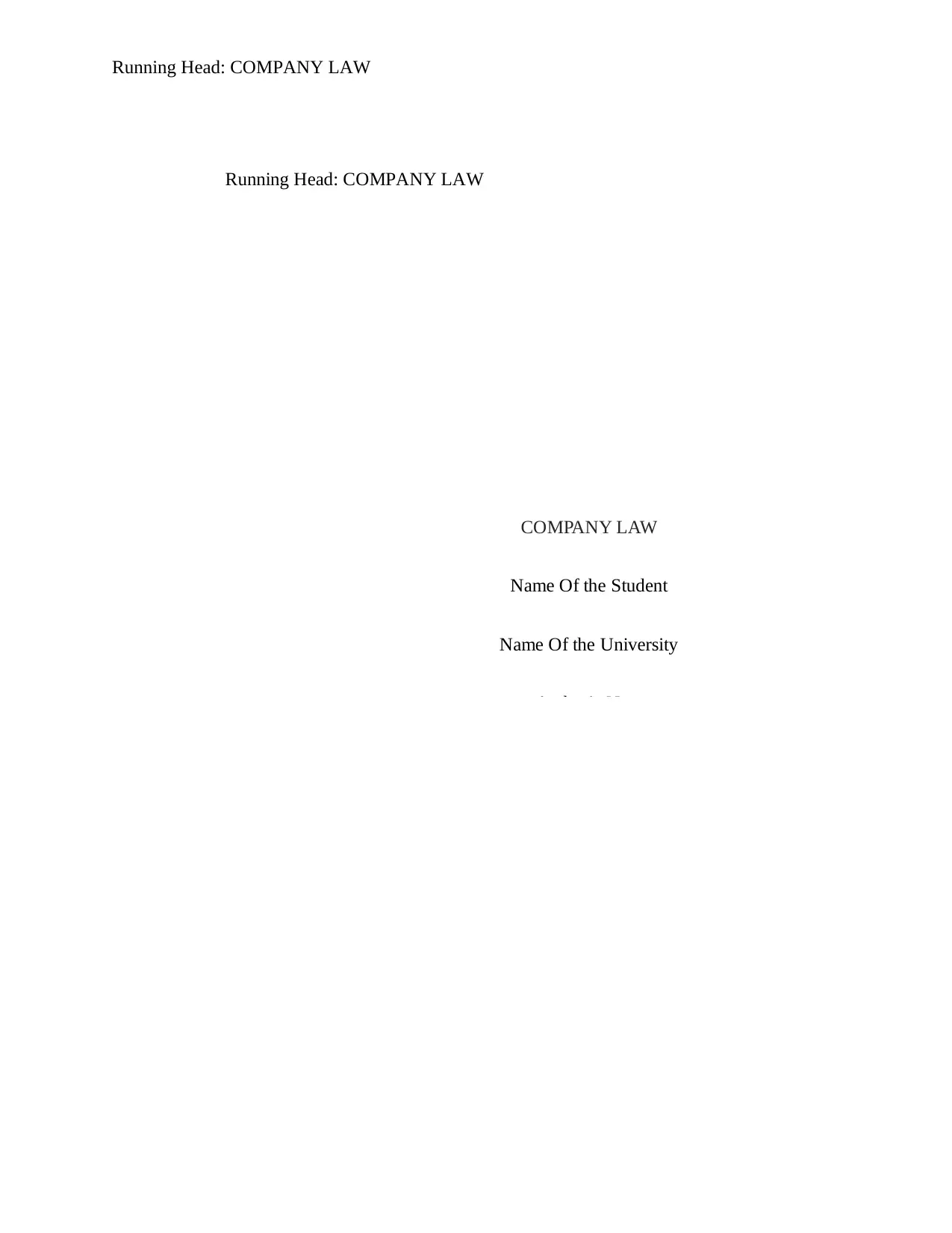
Running Head: COMPANY LAW
Running Head: COMPANY LAW
COMPANY LAW
Name Of the Student
Name Of the University
Author’s Note
Running Head: COMPANY LAW
COMPANY LAW
Name Of the Student
Name Of the University
Author’s Note
Paraphrase This Document
Need a fresh take? Get an instant paraphrase of this document with our AI Paraphraser
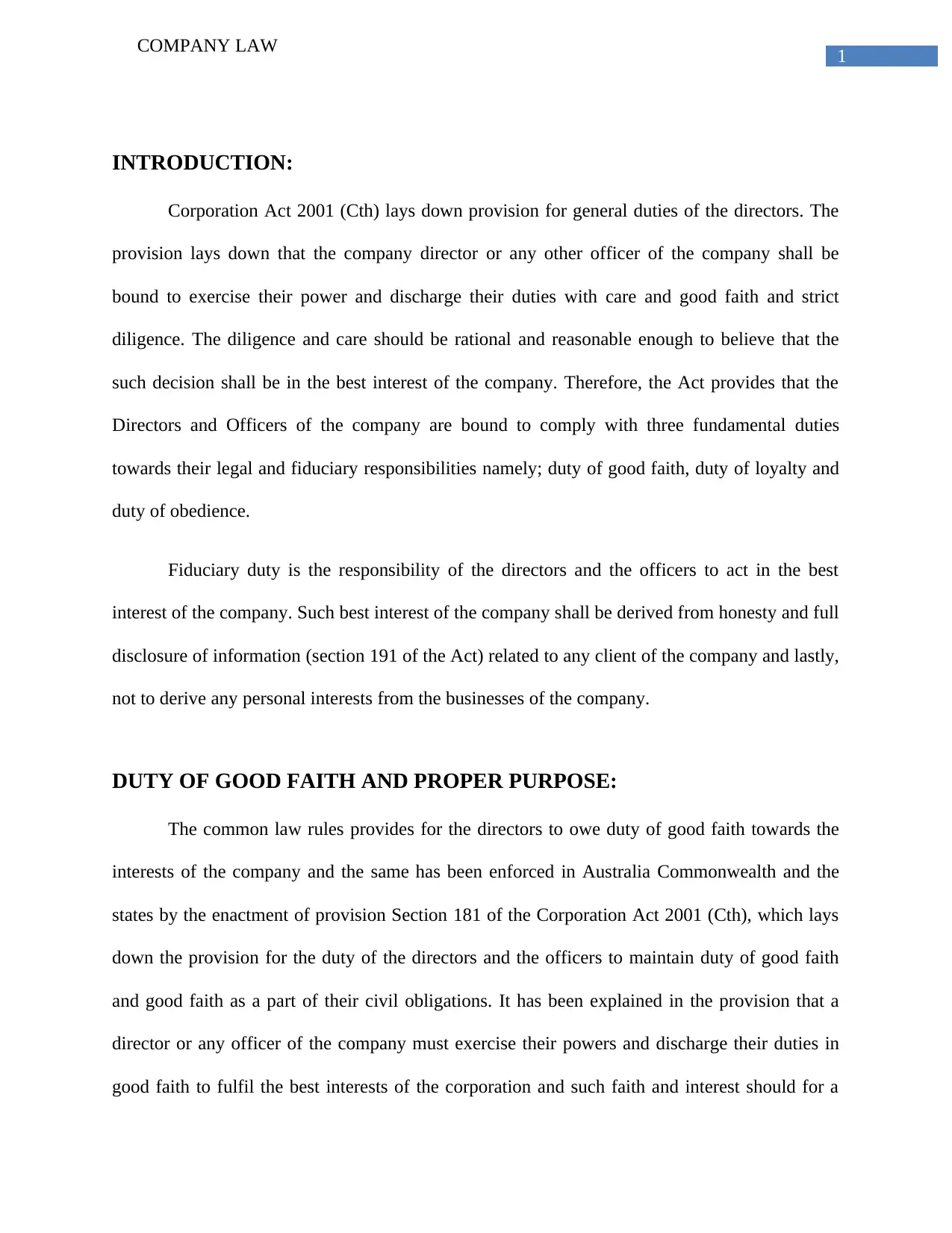
1
COMPANY LAW
INTRODUCTION:
Corporation Act 2001 (Cth) lays down provision for general duties of the directors. The
provision lays down that the company director or any other officer of the company shall be
bound to exercise their power and discharge their duties with care and good faith and strict
diligence. The diligence and care should be rational and reasonable enough to believe that the
such decision shall be in the best interest of the company. Therefore, the Act provides that the
Directors and Officers of the company are bound to comply with three fundamental duties
towards their legal and fiduciary responsibilities namely; duty of good faith, duty of loyalty and
duty of obedience.
Fiduciary duty is the responsibility of the directors and the officers to act in the best
interest of the company. Such best interest of the company shall be derived from honesty and full
disclosure of information (section 191 of the Act) related to any client of the company and lastly,
not to derive any personal interests from the businesses of the company.
DUTY OF GOOD FAITH AND PROPER PURPOSE:
The common law rules provides for the directors to owe duty of good faith towards the
interests of the company and the same has been enforced in Australia Commonwealth and the
states by the enactment of provision Section 181 of the Corporation Act 2001 (Cth), which lays
down the provision for the duty of the directors and the officers to maintain duty of good faith
and good faith as a part of their civil obligations. It has been explained in the provision that a
director or any officer of the company must exercise their powers and discharge their duties in
good faith to fulfil the best interests of the corporation and such faith and interest should for a
COMPANY LAW
INTRODUCTION:
Corporation Act 2001 (Cth) lays down provision for general duties of the directors. The
provision lays down that the company director or any other officer of the company shall be
bound to exercise their power and discharge their duties with care and good faith and strict
diligence. The diligence and care should be rational and reasonable enough to believe that the
such decision shall be in the best interest of the company. Therefore, the Act provides that the
Directors and Officers of the company are bound to comply with three fundamental duties
towards their legal and fiduciary responsibilities namely; duty of good faith, duty of loyalty and
duty of obedience.
Fiduciary duty is the responsibility of the directors and the officers to act in the best
interest of the company. Such best interest of the company shall be derived from honesty and full
disclosure of information (section 191 of the Act) related to any client of the company and lastly,
not to derive any personal interests from the businesses of the company.
DUTY OF GOOD FAITH AND PROPER PURPOSE:
The common law rules provides for the directors to owe duty of good faith towards the
interests of the company and the same has been enforced in Australia Commonwealth and the
states by the enactment of provision Section 181 of the Corporation Act 2001 (Cth), which lays
down the provision for the duty of the directors and the officers to maintain duty of good faith
and good faith as a part of their civil obligations. It has been explained in the provision that a
director or any officer of the company must exercise their powers and discharge their duties in
good faith to fulfil the best interests of the corporation and such faith and interest should for a
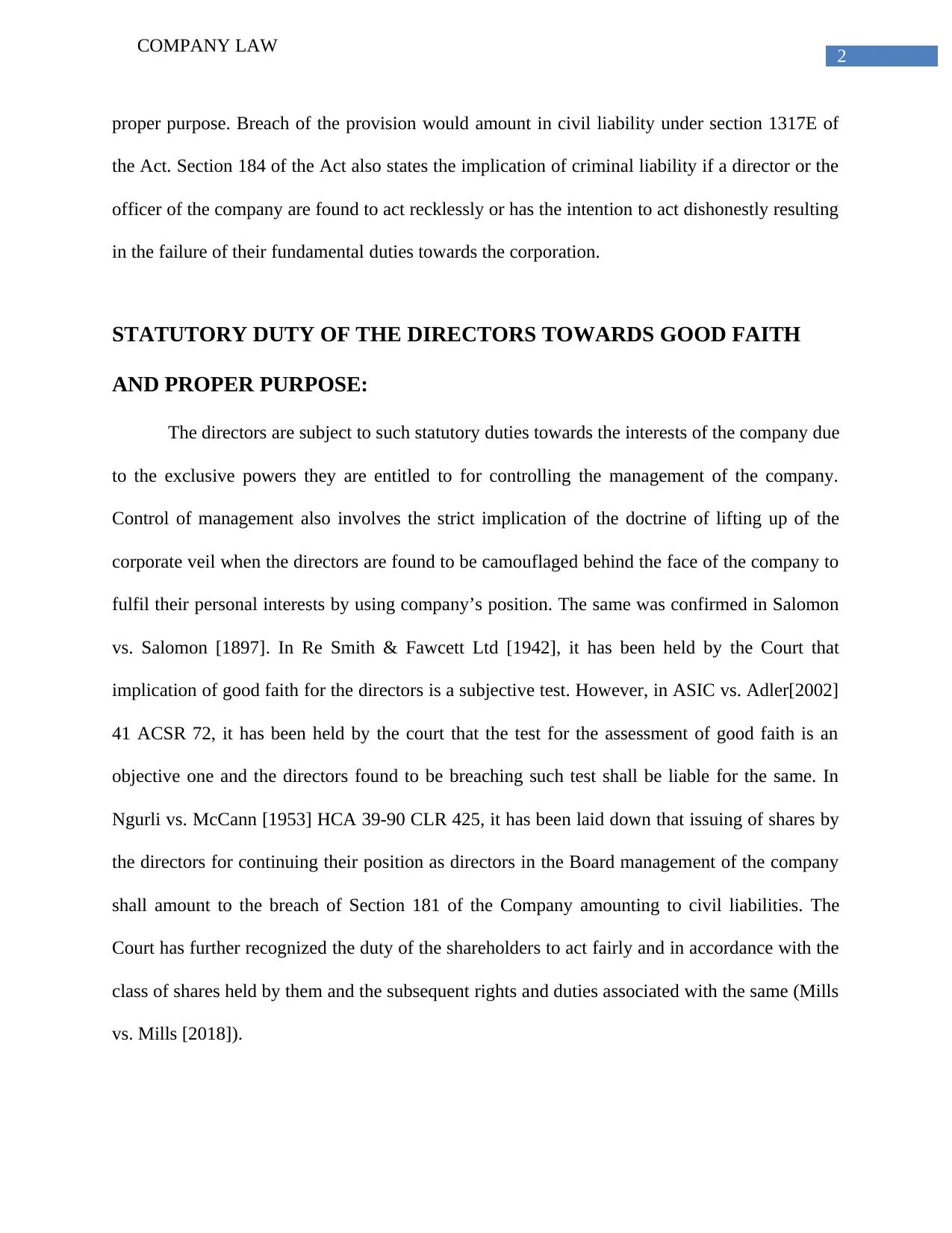
2
COMPANY LAW
proper purpose. Breach of the provision would amount in civil liability under section 1317E of
the Act. Section 184 of the Act also states the implication of criminal liability if a director or the
officer of the company are found to act recklessly or has the intention to act dishonestly resulting
in the failure of their fundamental duties towards the corporation.
STATUTORY DUTY OF THE DIRECTORS TOWARDS GOOD FAITH
AND PROPER PURPOSE:
The directors are subject to such statutory duties towards the interests of the company due
to the exclusive powers they are entitled to for controlling the management of the company.
Control of management also involves the strict implication of the doctrine of lifting up of the
corporate veil when the directors are found to be camouflaged behind the face of the company to
fulfil their personal interests by using company’s position. The same was confirmed in Salomon
vs. Salomon [1897]. In Re Smith & Fawcett Ltd [1942], it has been held by the Court that
implication of good faith for the directors is a subjective test. However, in ASIC vs. Adler[2002]
41 ACSR 72, it has been held by the court that the test for the assessment of good faith is an
objective one and the directors found to be breaching such test shall be liable for the same. In
Ngurli vs. McCann [1953] HCA 39-90 CLR 425, it has been laid down that issuing of shares by
the directors for continuing their position as directors in the Board management of the company
shall amount to the breach of Section 181 of the Company amounting to civil liabilities. The
Court has further recognized the duty of the shareholders to act fairly and in accordance with the
class of shares held by them and the subsequent rights and duties associated with the same (Mills
vs. Mills [2018]).
COMPANY LAW
proper purpose. Breach of the provision would amount in civil liability under section 1317E of
the Act. Section 184 of the Act also states the implication of criminal liability if a director or the
officer of the company are found to act recklessly or has the intention to act dishonestly resulting
in the failure of their fundamental duties towards the corporation.
STATUTORY DUTY OF THE DIRECTORS TOWARDS GOOD FAITH
AND PROPER PURPOSE:
The directors are subject to such statutory duties towards the interests of the company due
to the exclusive powers they are entitled to for controlling the management of the company.
Control of management also involves the strict implication of the doctrine of lifting up of the
corporate veil when the directors are found to be camouflaged behind the face of the company to
fulfil their personal interests by using company’s position. The same was confirmed in Salomon
vs. Salomon [1897]. In Re Smith & Fawcett Ltd [1942], it has been held by the Court that
implication of good faith for the directors is a subjective test. However, in ASIC vs. Adler[2002]
41 ACSR 72, it has been held by the court that the test for the assessment of good faith is an
objective one and the directors found to be breaching such test shall be liable for the same. In
Ngurli vs. McCann [1953] HCA 39-90 CLR 425, it has been laid down that issuing of shares by
the directors for continuing their position as directors in the Board management of the company
shall amount to the breach of Section 181 of the Company amounting to civil liabilities. The
Court has further recognized the duty of the shareholders to act fairly and in accordance with the
class of shares held by them and the subsequent rights and duties associated with the same (Mills
vs. Mills [2018]).
⊘ This is a preview!⊘
Do you want full access?
Subscribe today to unlock all pages.

Trusted by 1+ million students worldwide
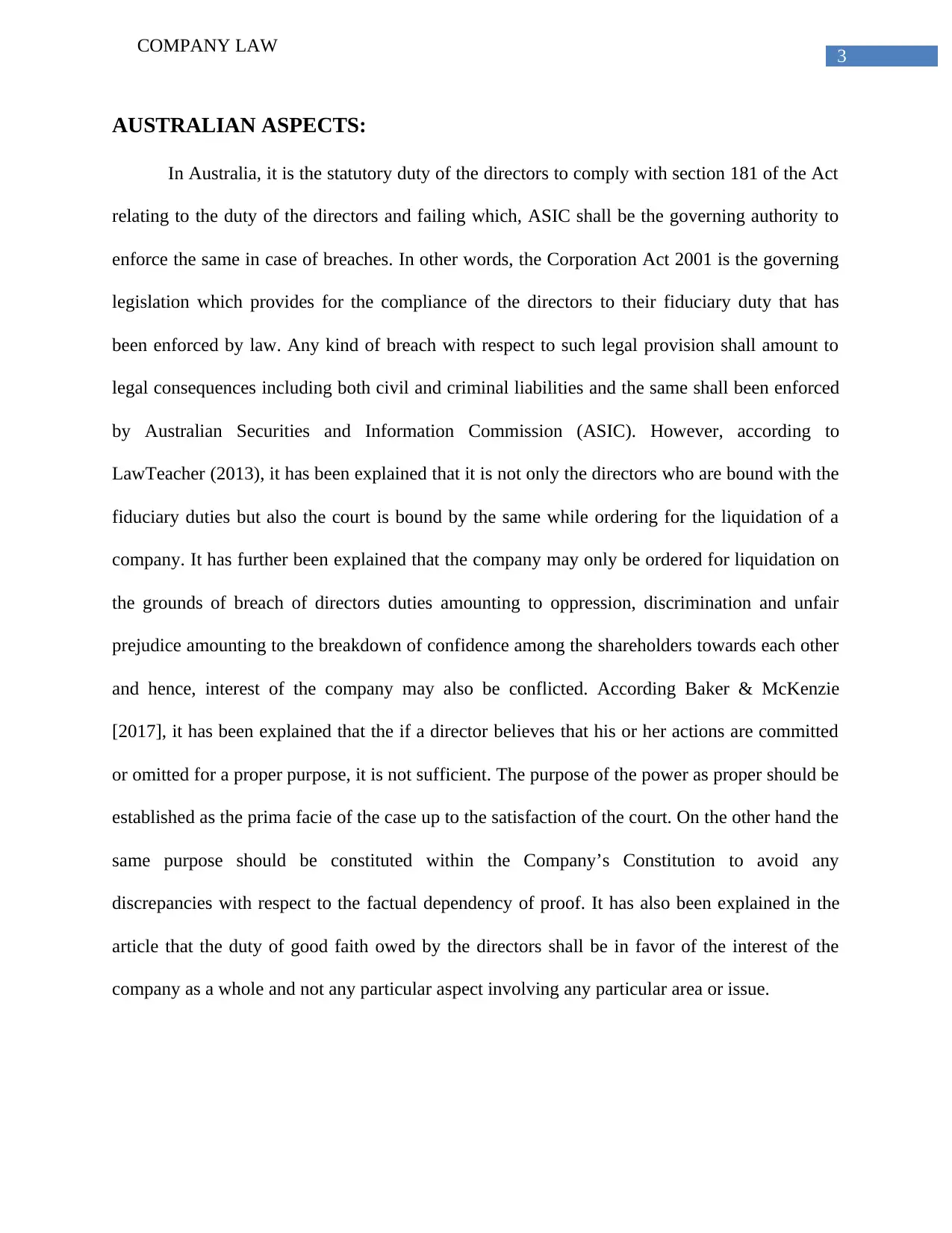
3
COMPANY LAW
AUSTRALIAN ASPECTS:
In Australia, it is the statutory duty of the directors to comply with section 181 of the Act
relating to the duty of the directors and failing which, ASIC shall be the governing authority to
enforce the same in case of breaches. In other words, the Corporation Act 2001 is the governing
legislation which provides for the compliance of the directors to their fiduciary duty that has
been enforced by law. Any kind of breach with respect to such legal provision shall amount to
legal consequences including both civil and criminal liabilities and the same shall been enforced
by Australian Securities and Information Commission (ASIC). However, according to
LawTeacher (2013), it has been explained that it is not only the directors who are bound with the
fiduciary duties but also the court is bound by the same while ordering for the liquidation of a
company. It has further been explained that the company may only be ordered for liquidation on
the grounds of breach of directors duties amounting to oppression, discrimination and unfair
prejudice amounting to the breakdown of confidence among the shareholders towards each other
and hence, interest of the company may also be conflicted. According Baker & McKenzie
[2017], it has been explained that the if a director believes that his or her actions are committed
or omitted for a proper purpose, it is not sufficient. The purpose of the power as proper should be
established as the prima facie of the case up to the satisfaction of the court. On the other hand the
same purpose should be constituted within the Company’s Constitution to avoid any
discrepancies with respect to the factual dependency of proof. It has also been explained in the
article that the duty of good faith owed by the directors shall be in favor of the interest of the
company as a whole and not any particular aspect involving any particular area or issue.
COMPANY LAW
AUSTRALIAN ASPECTS:
In Australia, it is the statutory duty of the directors to comply with section 181 of the Act
relating to the duty of the directors and failing which, ASIC shall be the governing authority to
enforce the same in case of breaches. In other words, the Corporation Act 2001 is the governing
legislation which provides for the compliance of the directors to their fiduciary duty that has
been enforced by law. Any kind of breach with respect to such legal provision shall amount to
legal consequences including both civil and criminal liabilities and the same shall been enforced
by Australian Securities and Information Commission (ASIC). However, according to
LawTeacher (2013), it has been explained that it is not only the directors who are bound with the
fiduciary duties but also the court is bound by the same while ordering for the liquidation of a
company. It has further been explained that the company may only be ordered for liquidation on
the grounds of breach of directors duties amounting to oppression, discrimination and unfair
prejudice amounting to the breakdown of confidence among the shareholders towards each other
and hence, interest of the company may also be conflicted. According Baker & McKenzie
[2017], it has been explained that the if a director believes that his or her actions are committed
or omitted for a proper purpose, it is not sufficient. The purpose of the power as proper should be
established as the prima facie of the case up to the satisfaction of the court. On the other hand the
same purpose should be constituted within the Company’s Constitution to avoid any
discrepancies with respect to the factual dependency of proof. It has also been explained in the
article that the duty of good faith owed by the directors shall be in favor of the interest of the
company as a whole and not any particular aspect involving any particular area or issue.
Paraphrase This Document
Need a fresh take? Get an instant paraphrase of this document with our AI Paraphraser
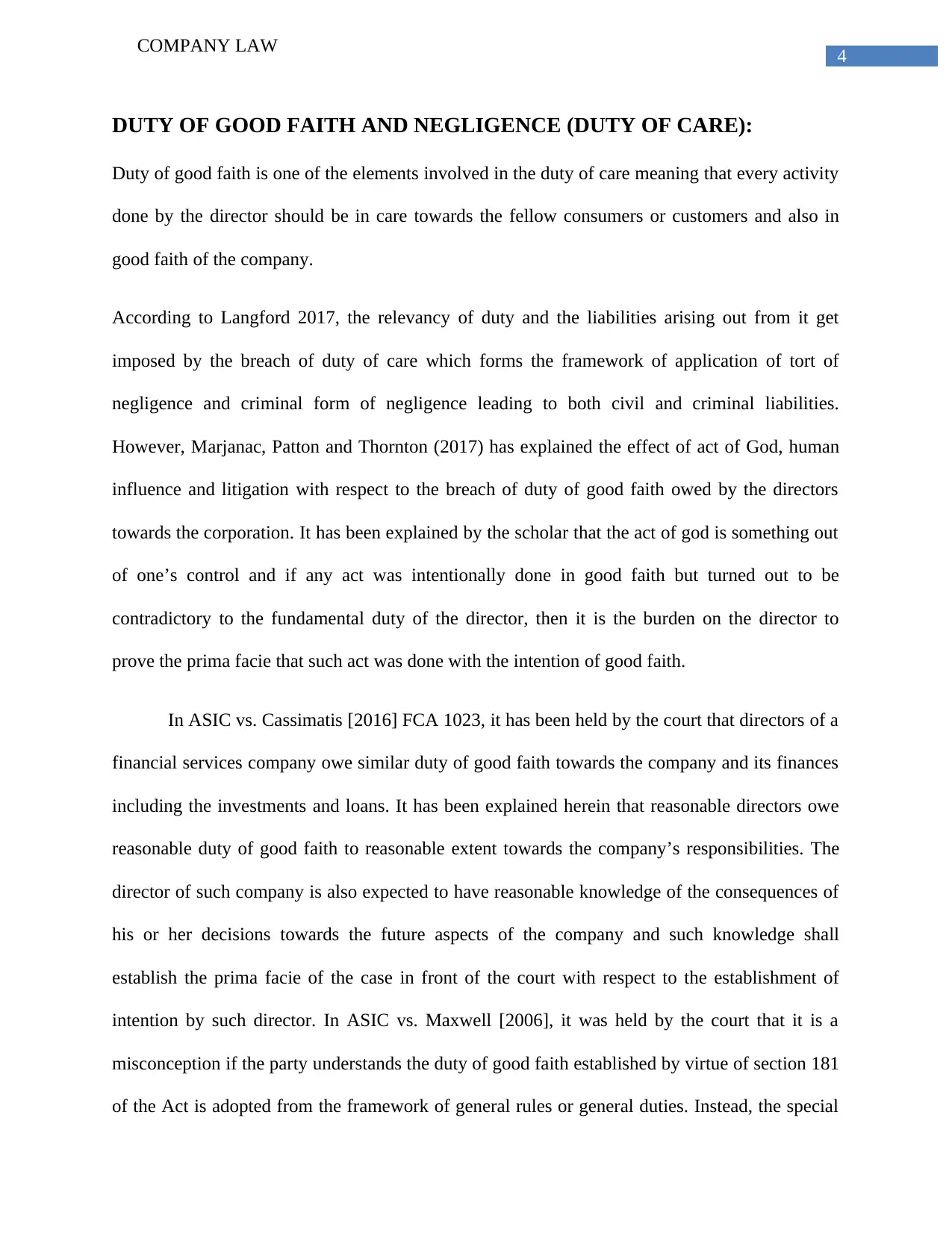
4
COMPANY LAW
DUTY OF GOOD FAITH AND NEGLIGENCE (DUTY OF CARE):
Duty of good faith is one of the elements involved in the duty of care meaning that every activity
done by the director should be in care towards the fellow consumers or customers and also in
good faith of the company.
According to Langford 2017, the relevancy of duty and the liabilities arising out from it get
imposed by the breach of duty of care which forms the framework of application of tort of
negligence and criminal form of negligence leading to both civil and criminal liabilities.
However, Marjanac, Patton and Thornton (2017) has explained the effect of act of God, human
influence and litigation with respect to the breach of duty of good faith owed by the directors
towards the corporation. It has been explained by the scholar that the act of god is something out
of one’s control and if any act was intentionally done in good faith but turned out to be
contradictory to the fundamental duty of the director, then it is the burden on the director to
prove the prima facie that such act was done with the intention of good faith.
In ASIC vs. Cassimatis [2016] FCA 1023, it has been held by the court that directors of a
financial services company owe similar duty of good faith towards the company and its finances
including the investments and loans. It has been explained herein that reasonable directors owe
reasonable duty of good faith to reasonable extent towards the company’s responsibilities. The
director of such company is also expected to have reasonable knowledge of the consequences of
his or her decisions towards the future aspects of the company and such knowledge shall
establish the prima facie of the case in front of the court with respect to the establishment of
intention by such director. In ASIC vs. Maxwell [2006], it was held by the court that it is a
misconception if the party understands the duty of good faith established by virtue of section 181
of the Act is adopted from the framework of general rules or general duties. Instead, the special
COMPANY LAW
DUTY OF GOOD FAITH AND NEGLIGENCE (DUTY OF CARE):
Duty of good faith is one of the elements involved in the duty of care meaning that every activity
done by the director should be in care towards the fellow consumers or customers and also in
good faith of the company.
According to Langford 2017, the relevancy of duty and the liabilities arising out from it get
imposed by the breach of duty of care which forms the framework of application of tort of
negligence and criminal form of negligence leading to both civil and criminal liabilities.
However, Marjanac, Patton and Thornton (2017) has explained the effect of act of God, human
influence and litigation with respect to the breach of duty of good faith owed by the directors
towards the corporation. It has been explained by the scholar that the act of god is something out
of one’s control and if any act was intentionally done in good faith but turned out to be
contradictory to the fundamental duty of the director, then it is the burden on the director to
prove the prima facie that such act was done with the intention of good faith.
In ASIC vs. Cassimatis [2016] FCA 1023, it has been held by the court that directors of a
financial services company owe similar duty of good faith towards the company and its finances
including the investments and loans. It has been explained herein that reasonable directors owe
reasonable duty of good faith to reasonable extent towards the company’s responsibilities. The
director of such company is also expected to have reasonable knowledge of the consequences of
his or her decisions towards the future aspects of the company and such knowledge shall
establish the prima facie of the case in front of the court with respect to the establishment of
intention by such director. In ASIC vs. Maxwell [2006], it was held by the court that it is a
misconception if the party understands the duty of good faith established by virtue of section 181
of the Act is adopted from the framework of general rules or general duties. Instead, the special
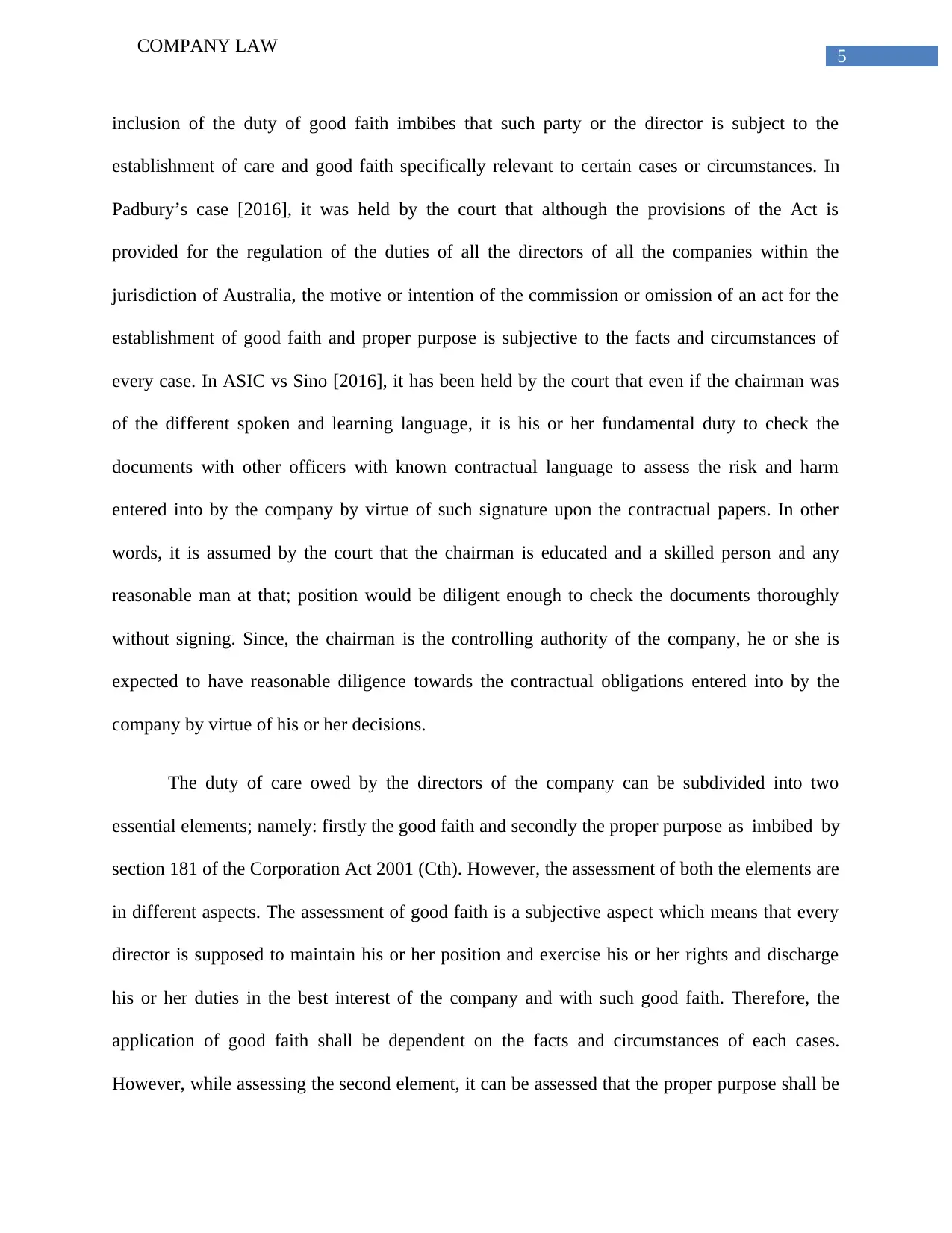
5
COMPANY LAW
inclusion of the duty of good faith imbibes that such party or the director is subject to the
establishment of care and good faith specifically relevant to certain cases or circumstances. In
Padbury’s case [2016], it was held by the court that although the provisions of the Act is
provided for the regulation of the duties of all the directors of all the companies within the
jurisdiction of Australia, the motive or intention of the commission or omission of an act for the
establishment of good faith and proper purpose is subjective to the facts and circumstances of
every case. In ASIC vs Sino [2016], it has been held by the court that even if the chairman was
of the different spoken and learning language, it is his or her fundamental duty to check the
documents with other officers with known contractual language to assess the risk and harm
entered into by the company by virtue of such signature upon the contractual papers. In other
words, it is assumed by the court that the chairman is educated and a skilled person and any
reasonable man at that; position would be diligent enough to check the documents thoroughly
without signing. Since, the chairman is the controlling authority of the company, he or she is
expected to have reasonable diligence towards the contractual obligations entered into by the
company by virtue of his or her decisions.
The duty of care owed by the directors of the company can be subdivided into two
essential elements; namely: firstly the good faith and secondly the proper purpose as imbibed by
section 181 of the Corporation Act 2001 (Cth). However, the assessment of both the elements are
in different aspects. The assessment of good faith is a subjective aspect which means that every
director is supposed to maintain his or her position and exercise his or her rights and discharge
his or her duties in the best interest of the company and with such good faith. Therefore, the
application of good faith shall be dependent on the facts and circumstances of each cases.
However, while assessing the second element, it can be assessed that the proper purpose shall be
COMPANY LAW
inclusion of the duty of good faith imbibes that such party or the director is subject to the
establishment of care and good faith specifically relevant to certain cases or circumstances. In
Padbury’s case [2016], it was held by the court that although the provisions of the Act is
provided for the regulation of the duties of all the directors of all the companies within the
jurisdiction of Australia, the motive or intention of the commission or omission of an act for the
establishment of good faith and proper purpose is subjective to the facts and circumstances of
every case. In ASIC vs Sino [2016], it has been held by the court that even if the chairman was
of the different spoken and learning language, it is his or her fundamental duty to check the
documents with other officers with known contractual language to assess the risk and harm
entered into by the company by virtue of such signature upon the contractual papers. In other
words, it is assumed by the court that the chairman is educated and a skilled person and any
reasonable man at that; position would be diligent enough to check the documents thoroughly
without signing. Since, the chairman is the controlling authority of the company, he or she is
expected to have reasonable diligence towards the contractual obligations entered into by the
company by virtue of his or her decisions.
The duty of care owed by the directors of the company can be subdivided into two
essential elements; namely: firstly the good faith and secondly the proper purpose as imbibed by
section 181 of the Corporation Act 2001 (Cth). However, the assessment of both the elements are
in different aspects. The assessment of good faith is a subjective aspect which means that every
director is supposed to maintain his or her position and exercise his or her rights and discharge
his or her duties in the best interest of the company and with such good faith. Therefore, the
application of good faith shall be dependent on the facts and circumstances of each cases.
However, while assessing the second element, it can be assessed that the proper purpose shall be
⊘ This is a preview!⊘
Do you want full access?
Subscribe today to unlock all pages.

Trusted by 1+ million students worldwide
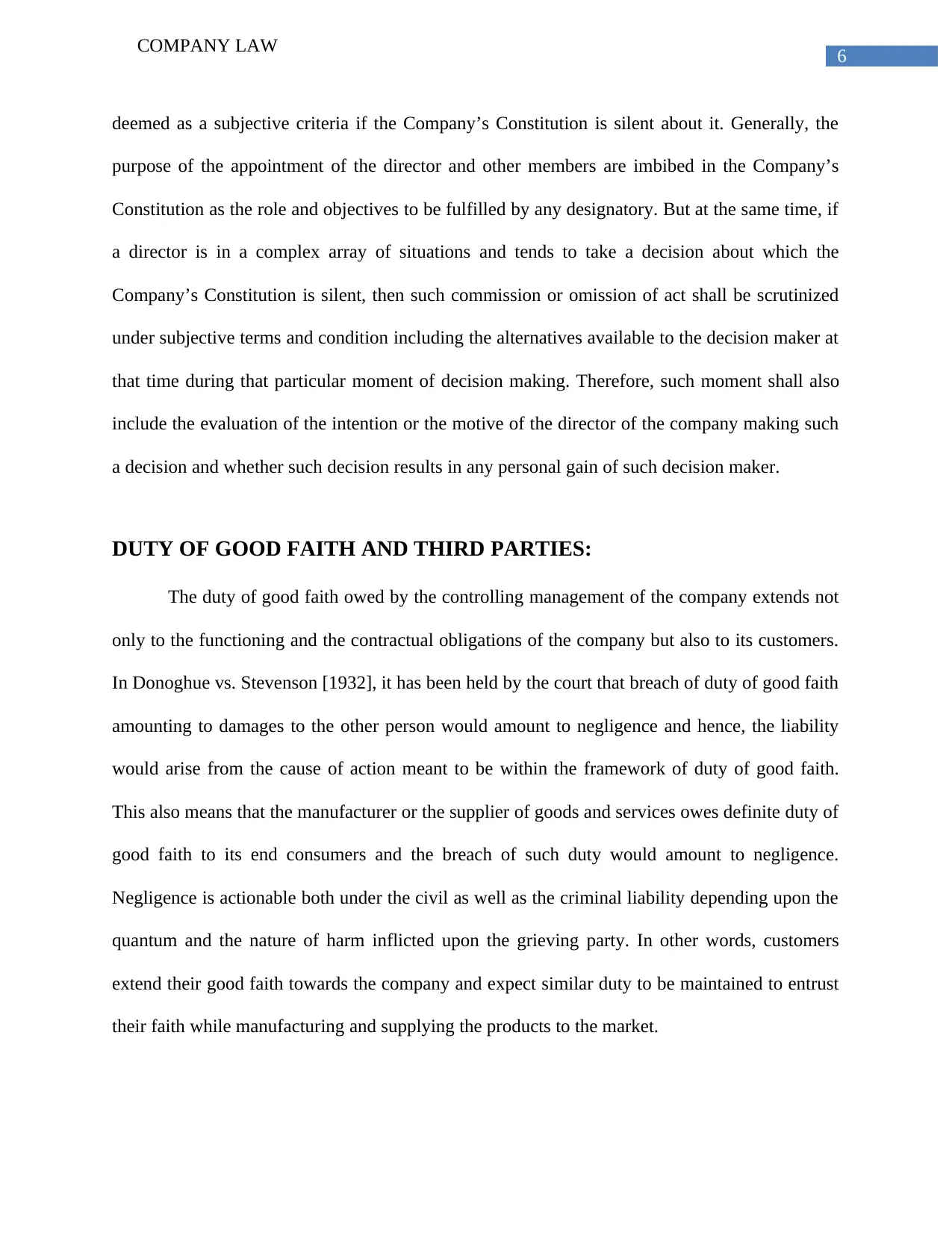
6
COMPANY LAW
deemed as a subjective criteria if the Company’s Constitution is silent about it. Generally, the
purpose of the appointment of the director and other members are imbibed in the Company’s
Constitution as the role and objectives to be fulfilled by any designatory. But at the same time, if
a director is in a complex array of situations and tends to take a decision about which the
Company’s Constitution is silent, then such commission or omission of act shall be scrutinized
under subjective terms and condition including the alternatives available to the decision maker at
that time during that particular moment of decision making. Therefore, such moment shall also
include the evaluation of the intention or the motive of the director of the company making such
a decision and whether such decision results in any personal gain of such decision maker.
DUTY OF GOOD FAITH AND THIRD PARTIES:
The duty of good faith owed by the controlling management of the company extends not
only to the functioning and the contractual obligations of the company but also to its customers.
In Donoghue vs. Stevenson [1932], it has been held by the court that breach of duty of good faith
amounting to damages to the other person would amount to negligence and hence, the liability
would arise from the cause of action meant to be within the framework of duty of good faith.
This also means that the manufacturer or the supplier of goods and services owes definite duty of
good faith to its end consumers and the breach of such duty would amount to negligence.
Negligence is actionable both under the civil as well as the criminal liability depending upon the
quantum and the nature of harm inflicted upon the grieving party. In other words, customers
extend their good faith towards the company and expect similar duty to be maintained to entrust
their faith while manufacturing and supplying the products to the market.
COMPANY LAW
deemed as a subjective criteria if the Company’s Constitution is silent about it. Generally, the
purpose of the appointment of the director and other members are imbibed in the Company’s
Constitution as the role and objectives to be fulfilled by any designatory. But at the same time, if
a director is in a complex array of situations and tends to take a decision about which the
Company’s Constitution is silent, then such commission or omission of act shall be scrutinized
under subjective terms and condition including the alternatives available to the decision maker at
that time during that particular moment of decision making. Therefore, such moment shall also
include the evaluation of the intention or the motive of the director of the company making such
a decision and whether such decision results in any personal gain of such decision maker.
DUTY OF GOOD FAITH AND THIRD PARTIES:
The duty of good faith owed by the controlling management of the company extends not
only to the functioning and the contractual obligations of the company but also to its customers.
In Donoghue vs. Stevenson [1932], it has been held by the court that breach of duty of good faith
amounting to damages to the other person would amount to negligence and hence, the liability
would arise from the cause of action meant to be within the framework of duty of good faith.
This also means that the manufacturer or the supplier of goods and services owes definite duty of
good faith to its end consumers and the breach of such duty would amount to negligence.
Negligence is actionable both under the civil as well as the criminal liability depending upon the
quantum and the nature of harm inflicted upon the grieving party. In other words, customers
extend their good faith towards the company and expect similar duty to be maintained to entrust
their faith while manufacturing and supplying the products to the market.
Paraphrase This Document
Need a fresh take? Get an instant paraphrase of this document with our AI Paraphraser
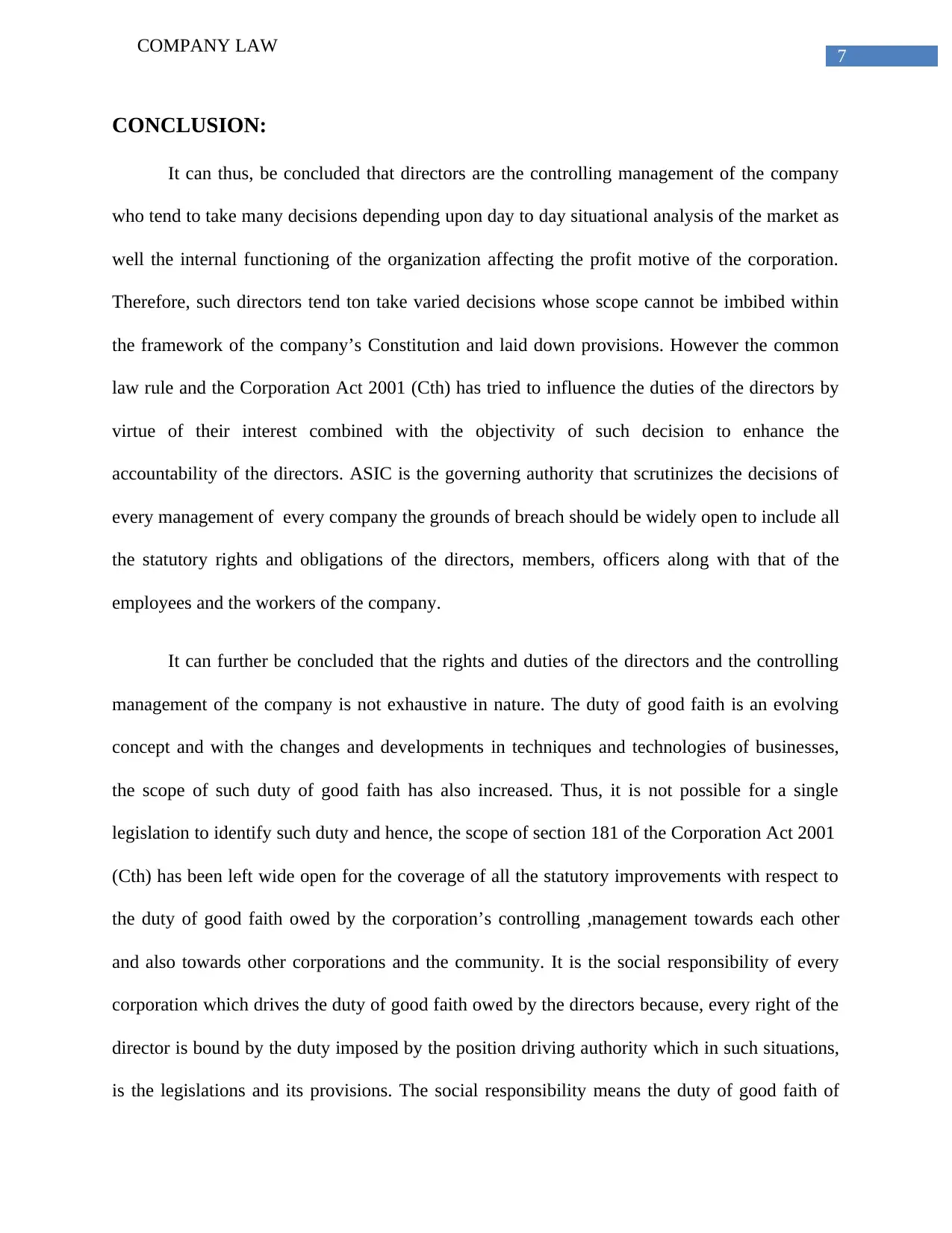
7
COMPANY LAW
CONCLUSION:
It can thus, be concluded that directors are the controlling management of the company
who tend to take many decisions depending upon day to day situational analysis of the market as
well the internal functioning of the organization affecting the profit motive of the corporation.
Therefore, such directors tend ton take varied decisions whose scope cannot be imbibed within
the framework of the company’s Constitution and laid down provisions. However the common
law rule and the Corporation Act 2001 (Cth) has tried to influence the duties of the directors by
virtue of their interest combined with the objectivity of such decision to enhance the
accountability of the directors. ASIC is the governing authority that scrutinizes the decisions of
every management of every company the grounds of breach should be widely open to include all
the statutory rights and obligations of the directors, members, officers along with that of the
employees and the workers of the company.
It can further be concluded that the rights and duties of the directors and the controlling
management of the company is not exhaustive in nature. The duty of good faith is an evolving
concept and with the changes and developments in techniques and technologies of businesses,
the scope of such duty of good faith has also increased. Thus, it is not possible for a single
legislation to identify such duty and hence, the scope of section 181 of the Corporation Act 2001
(Cth) has been left wide open for the coverage of all the statutory improvements with respect to
the duty of good faith owed by the corporation’s controlling ,management towards each other
and also towards other corporations and the community. It is the social responsibility of every
corporation which drives the duty of good faith owed by the directors because, every right of the
director is bound by the duty imposed by the position driving authority which in such situations,
is the legislations and its provisions. The social responsibility means the duty of good faith of
COMPANY LAW
CONCLUSION:
It can thus, be concluded that directors are the controlling management of the company
who tend to take many decisions depending upon day to day situational analysis of the market as
well the internal functioning of the organization affecting the profit motive of the corporation.
Therefore, such directors tend ton take varied decisions whose scope cannot be imbibed within
the framework of the company’s Constitution and laid down provisions. However the common
law rule and the Corporation Act 2001 (Cth) has tried to influence the duties of the directors by
virtue of their interest combined with the objectivity of such decision to enhance the
accountability of the directors. ASIC is the governing authority that scrutinizes the decisions of
every management of every company the grounds of breach should be widely open to include all
the statutory rights and obligations of the directors, members, officers along with that of the
employees and the workers of the company.
It can further be concluded that the rights and duties of the directors and the controlling
management of the company is not exhaustive in nature. The duty of good faith is an evolving
concept and with the changes and developments in techniques and technologies of businesses,
the scope of such duty of good faith has also increased. Thus, it is not possible for a single
legislation to identify such duty and hence, the scope of section 181 of the Corporation Act 2001
(Cth) has been left wide open for the coverage of all the statutory improvements with respect to
the duty of good faith owed by the corporation’s controlling ,management towards each other
and also towards other corporations and the community. It is the social responsibility of every
corporation which drives the duty of good faith owed by the directors because, every right of the
director is bound by the duty imposed by the position driving authority which in such situations,
is the legislations and its provisions. The social responsibility means the duty of good faith of
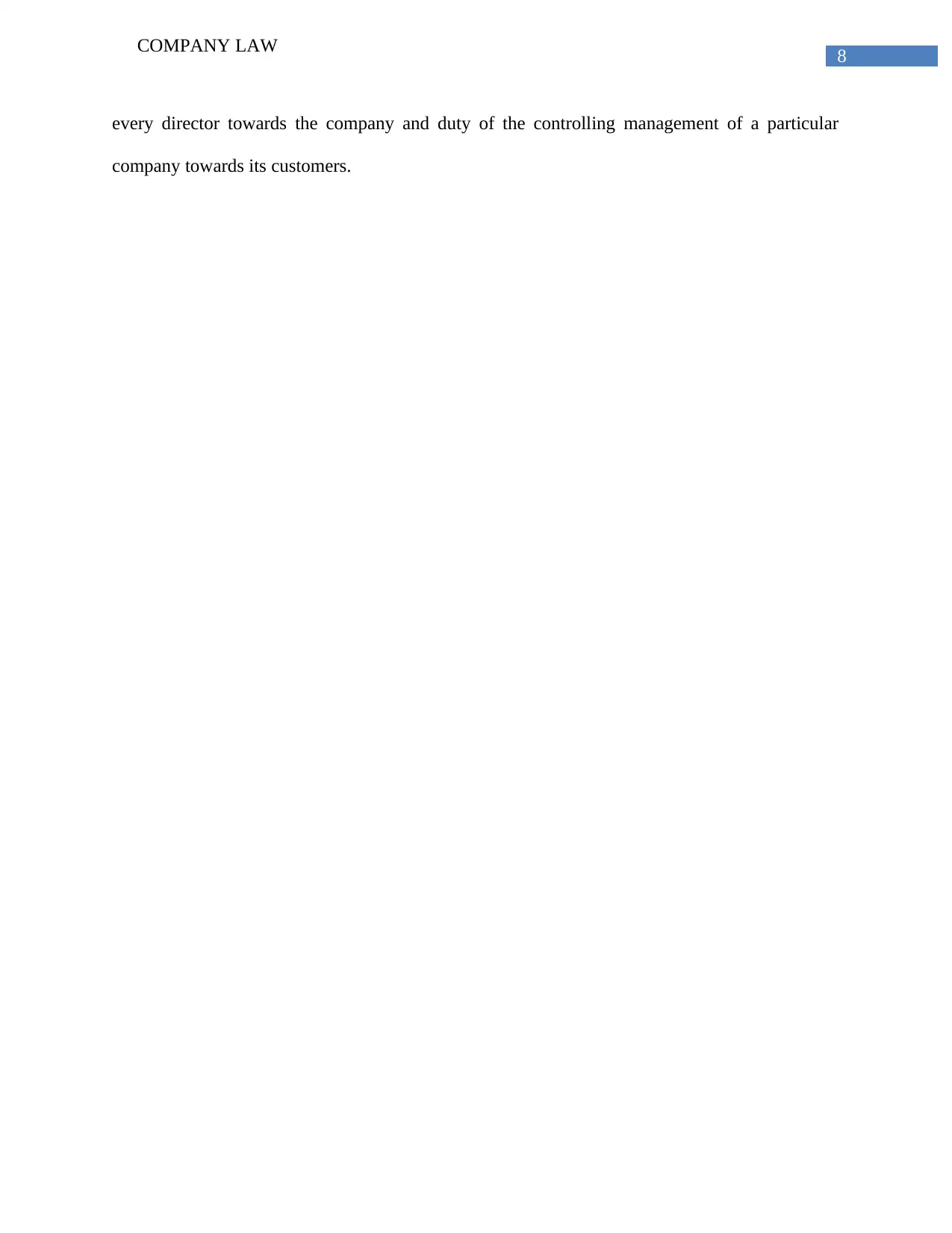
8
COMPANY LAW
every director towards the company and duty of the controlling management of a particular
company towards its customers.
COMPANY LAW
every director towards the company and duty of the controlling management of a particular
company towards its customers.
⊘ This is a preview!⊘
Do you want full access?
Subscribe today to unlock all pages.

Trusted by 1+ million students worldwide
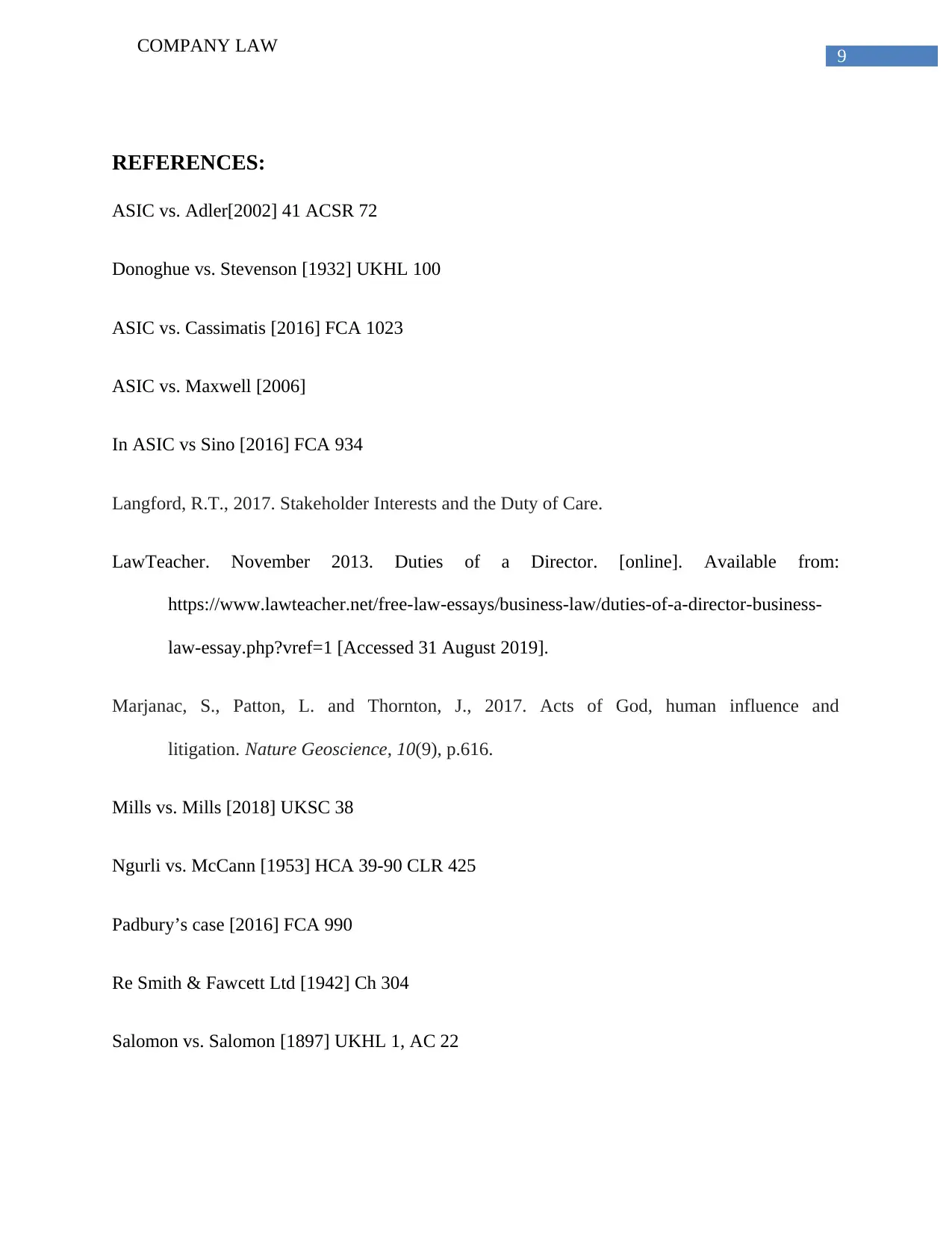
9
COMPANY LAW
REFERENCES:
ASIC vs. Adler[2002] 41 ACSR 72
Donoghue vs. Stevenson [1932] UKHL 100
ASIC vs. Cassimatis [2016] FCA 1023
ASIC vs. Maxwell [2006]
In ASIC vs Sino [2016] FCA 934
Langford, R.T., 2017. Stakeholder Interests and the Duty of Care.
LawTeacher. November 2013. Duties of a Director. [online]. Available from:
https://www.lawteacher.net/free-law-essays/business-law/duties-of-a-director-business-
law-essay.php?vref=1 [Accessed 31 August 2019].
Marjanac, S., Patton, L. and Thornton, J., 2017. Acts of God, human influence and
litigation. Nature Geoscience, 10(9), p.616.
Mills vs. Mills [2018] UKSC 38
Ngurli vs. McCann [1953] HCA 39-90 CLR 425
Padbury’s case [2016] FCA 990
Re Smith & Fawcett Ltd [1942] Ch 304
Salomon vs. Salomon [1897] UKHL 1, AC 22
COMPANY LAW
REFERENCES:
ASIC vs. Adler[2002] 41 ACSR 72
Donoghue vs. Stevenson [1932] UKHL 100
ASIC vs. Cassimatis [2016] FCA 1023
ASIC vs. Maxwell [2006]
In ASIC vs Sino [2016] FCA 934
Langford, R.T., 2017. Stakeholder Interests and the Duty of Care.
LawTeacher. November 2013. Duties of a Director. [online]. Available from:
https://www.lawteacher.net/free-law-essays/business-law/duties-of-a-director-business-
law-essay.php?vref=1 [Accessed 31 August 2019].
Marjanac, S., Patton, L. and Thornton, J., 2017. Acts of God, human influence and
litigation. Nature Geoscience, 10(9), p.616.
Mills vs. Mills [2018] UKSC 38
Ngurli vs. McCann [1953] HCA 39-90 CLR 425
Padbury’s case [2016] FCA 990
Re Smith & Fawcett Ltd [1942] Ch 304
Salomon vs. Salomon [1897] UKHL 1, AC 22
1 out of 10
Related Documents
Your All-in-One AI-Powered Toolkit for Academic Success.
+13062052269
info@desklib.com
Available 24*7 on WhatsApp / Email
![[object Object]](/_next/static/media/star-bottom.7253800d.svg)
Unlock your academic potential
Copyright © 2020–2026 A2Z Services. All Rights Reserved. Developed and managed by ZUCOL.





